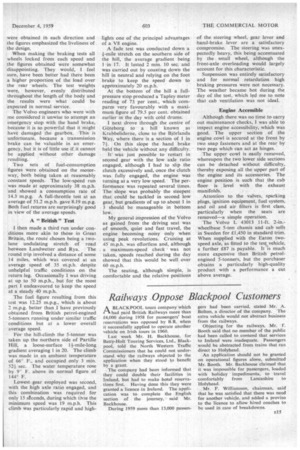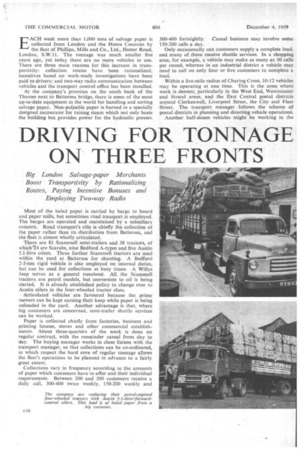Railways Oppose Blackpool Customers
Page 59

Page 60

If you've noticed an error in this article please click here to report it so we can fix it.
ABLACKPOOL tours company which had paid British Railways more than £4,000 during 1958 for passengers' boat reservations was opposed by B.R. when it successfully applied to operate another vehicle on Irish tours in 1960.
Last week Mr. H. Backhouse, for Batty-Holt Touring Services, Ltd., Blackpool, told the North Western Traffic commissioners that he could not understand why the railways objected to the application when they stood to benefit by a grant.
The company had been informed that they could double their facilities in Ireland, but had to make hotel reservations first. Having done this they were granted a licence in Ireland. The application was to complete the English section of the journey, said Mr. Backhouse.
During 1959 more than 13,000 passen
gers had been carried, stated Mr. A. Bolton, a director of the company.The extra vehicle would not abstract business from the railways.
Objecting for the railways, Mr. F. Booth said that no member of the public had been called to contend that services to Ireland were inadequate. Passengers would be abstracted from trains that ran direct to Holyhead.
An application should not be granted on operational figures alone, submitted Mr. Booth. Mr. Backhouse claimed that it was impossible for passengers, loaded with holiday impedimenta, to travel comfortably [torn Lancashire to Holyhead.
Mr. F. Williamson, chairman, said that he was satisfied that there was need for another vehicle, and added a proviso to the licence to allow hired coaches to he used in case of breakdowns.
EACH week more than 1,000 tons of salvage paper is collected from London and the Home Counties by the fleet of Phillips, Mills and Co., Ltd., Hester Road, London, S.W.11. The tonnage was much smaller five years ago, yet today there are no more vehicles in use. There are three main reasons for this increase in transportivity: collection routes have been rationalized; incentives based on work-study investigations have been paid to drivers; and two-way radio communication between vehicles and the transport control office has been installed.
At the company's premises on the south bank of the Thames next. to Battersea bridge, there is some of the most up-to-date equipment in the world for handling and sorting salvage paper. Non-pulpable paper is burned in a specially designed incinerator for raising steam which not only heats the building but provides power for the hydraulic presses. 300-400 fortnightly. Casual business may involve softie 150-200 calls a day.
Only occasionally can customers supply a complete load, and many of these receive shuttle services. In a shopping area, for example, a vehicle may make as many as 30 calls per round, whereas in an industrial district a vehicle may need to call on only four or five customers to complete a load.
Within a five-mile radius of Charing Cross, 10-12 vehicles may be operating at one time. This is the zone. where work is densest, particularly in the West End, Westminster and Strand areas, and the East Central postal districts around Clerkenwell, Liverpool Street, the City and Fleet Street. The transport manager follows the scheme of postal districts in planning and directing vehicle operations.
Another half-dozen vehicles might be working in the
























































































































